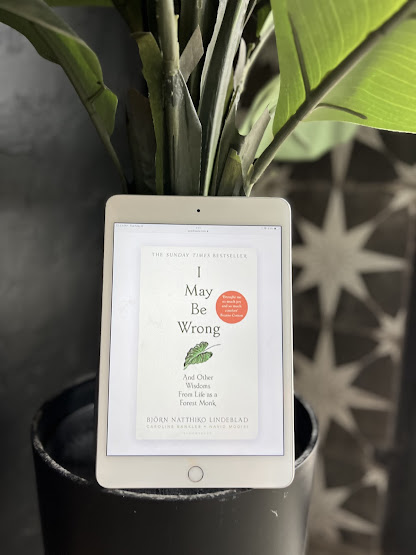The title caught me off guard at first—and reading the book surprised me even more. I was amazed by how deeply the author explored the nature of thought and expressed it so clearly in writing. With wisdom and insight wrapped in beautiful, gentle language, the author also lays bare his own vulnerability and fragility, making the book all the more powerful. Through one person’s life, we encounter the wisdom of meditation, deep reflections, and the painful days that followed his departure from monastic life, his father's euthanasia, and ultimately, how he comes to terms with his own life. I read it in one sitting. The latter part of the book left a heaviness in my heart and a lingering afterthought. I truly, wholeheartedly recommend this book.
“Even a ten-year-old child could probably explain what inner beauty is—patience, generosity, honesty, confidence, the ability to forgive, to think from others’ perspectives, empathy, listening, compassion, understanding, thoughtfulness... Everyone knows what true beauty looks like. But today’s culture doesn’t seem to encourage us to show these qualities outwardly. That’s exactly why I hope we focus more on this inner strength. In the short time we’re given, I want to say: let’s live by expressing the most beautiful and powerful qualities within us.”
“Perhaps the most painful thoughts are the ones that begin with, “I should have…” For example: “I should have changed,” “I should have been wiser,” “I should have worked harder,” “I should have been wealthier, better, thinner, more mature…” If you fall into this trap, it’s nearly impossible to get out. But even when such thoughts are running wild, there is something we can do: take a gentle step back. Then say, “Okay, I hear you. Let’s talk later.”
“The heart grows when it has the courage to face uncertainty. We gain true wisdom when we stop covering our ignorance with bias and learn to endure the fact that we cannot control everything.”
“We learn in stillness. So that we remember, even in the storm.” We can’t live our lives inside a shrine, but if we can find calm in a quiet place, we can step more firmly through the chaos of daily life.”
“When conflict begins to brew, when you find yourself about to clash with someone, repeat this mantra three times in your heart. If you do it sincerely in any language, your worries will vanish like morning dew on summer grass.” We were all in the palm of the monk’s hand. A moment of silence followed. Everyone held their breath, waiting for his next words. Leaning forward, after a dramatic pause, he finally spoke: “Now, I bet you’re all wondering what the mantra is. I’ll tell you. I could be wrong. I could be wrong. I could be wrong.”
“Ajahn Chah once said, “A forest monk must always strive to let go, and become used to failing nine times out of ten.”
“It was when I faced helplessness that the door to joy opened again. My heart swelled, not with sadness, but with awe.”
“The words warned of the danger of certainty. When we cling only to what we think we already know, no experience or wisdom can truly enter us—and we end up missing so much. If we hope to reach higher wisdom, we must be willing to let go of conviction just a little, and grow comfortable with the truth that we really don’t know that much. It’s the assumption of knowing that causes real problems. But knowing that we don’t know? That rarely causes harm.”
“There was a monk from Oklahoma who hated me—really hated me—for four years. He made no effort to hide it, and he never let up. Looking back, life is full of irony. I had always been overly concerned with what others thought of me. Much of the hard work I did in my youth was driven by that fear. Maybe I needed someone like him—someone who just hated me for no reason. After being disliked so persistently and without explanation, I finally realized how pointless it is to try to be liked by everyone.”
“Seventeen years. Voluntarily. And what did I gain from all of it? I didn’t want to just throw out a vague answer. I wanted to speak the truth, exactly as I had experienced it. So I paused and looked deeply into myself. Before long, an answer rose from within: After 17 years of practice in search of enlightenment, I no longer believe every thought that crosses my mind. That’s my superpower.”
“We don’t choose our thoughts. We can’t control their shape or direction. But we can choose which thoughts we nurture and which ones we give as little room as possible. You can’t stop a thought from arising—but you can decide whether to believe it.”

Comments
Post a Comment